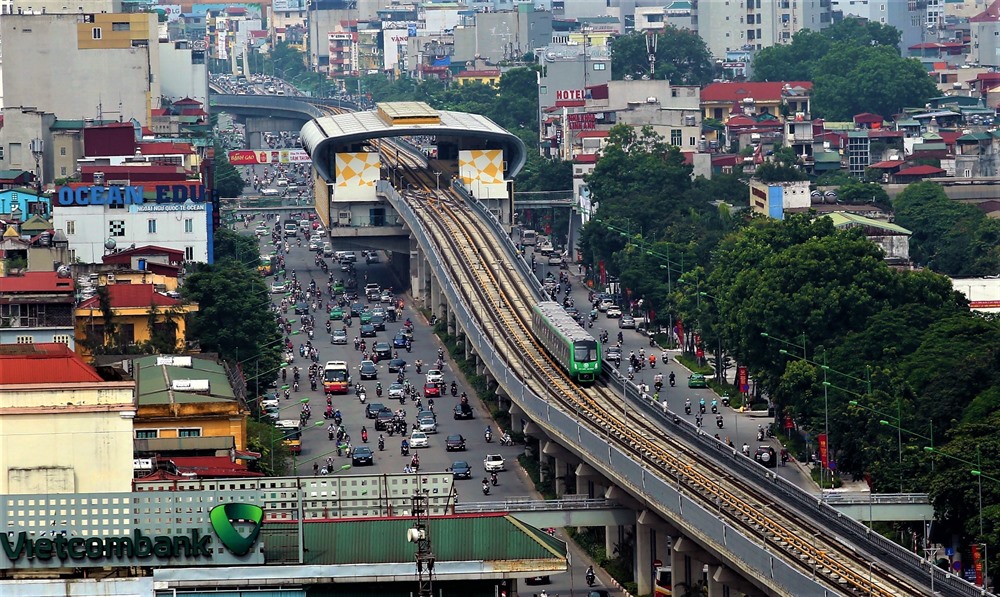.jfif) Opinion
Opinion

Vũ Văn Viện, Director of Hà Nội’s transport department, told Dân trí newspaper that the drastic barring of motorbikes is not meant to cause difficulties for the people.
 |
| A view of a part of Hà Nội’s fist metro project, Cát Linh-Hà Đông elevated railway. The city plans to phase out the use of motorbikes in inner districts by 2030 and expects public transit to be able to meet people’s travel demands. — VNA/VNS Photo Huy Hùng |
Vũ Văn Viện, Director of Hà Nội’s transport department, told Dân trí newspaper that the drastic barring of motorbikes is not meant to cause difficulties for the people.
In 2017, Hà Nội People’s Council adopted the resolution which puts into motion a plan to phase out motorbikes in the city’s inner districts by 2030. Why do you think the sooner the motorbikes are banned, the better?
The city’s resolution aims to restrict personal vehicles, including motorbikes and cars, in areas where public transport meets public demand and then a comprehensive ban on motorbikes will be imposed in 2030.
What I want is to implement the ban as soon as an area has an adequate public transport system, without waiting until 2030.
Do you think the city’s public transport can handle people’s needs once motorbikes are no longer allowed in the inner districts?
I am certain the city’s public transit will meet people’s demands. As of now, in the city’s centre there’s no shortage of public transport.
However, motorbikes have become an ingrained habit and not many are willing to give it up – even for a journey as short as 100m, people still use motorbikes.
Therefore, a ban is needed so that people could start switching to public transport.
In the plan, we have clearly stated the ban will only be enacted once there are viable transport methods for the public.
What about the many issues related to the connectivity between public transport and residential areas, such as waiting time for the buses and unreasonable distance towards the bus stops, which discourages people from using public transport?
In the plan, we clearly said that for the inner districts, we are striving to ensure that 80 per cent of the population could access the public transport system within 500m. The remaining 20 per cent of the population are those in the alleys and small streets, they could choose to walk, hail a taxi or ride a bike, whatever they feel appropriate.
We understand that personal vehicles mean more freedom and convenience but an individual’s convenience should not come at the expense of the entire society. Given Hà Nội’s population and growth trends, if personal vehicles continue to be used like now, traffic congestion would never be resolved.
A substantial part of the city’s economy is a ‘motorbike economy’. If the motorbike ban comes too early, do you think people will not have enough time to adapt and their livelihood will suffer as a result?
This issue has been debated heavily before the People’s Council adopted the resolution. However, until that 2030 mark, we still have 11 years, plenty of time for vast improvements in the city’s socio-economic conditions. I’m sure by that time people will rely less on motorbikes while e-commerce and e-Government will have become very common.
As I said, the motorbike habit has been formed and persisted for many years now, it is time to develop and encourage the habit of using public transport.
Of course, as people make such great personal sacrifice, the State must have a reasonable plan that ensures the travel demands would be met.
Is the ban a way for the city to leave the hard part to the city’s citizens?
The phasing out of the motorbikes is not meant to cause difficulties for the people, but that’s what needs to be done for the greater good, including better travel methods, cleaner environment and a sustainable developing city.
If the estimated six million motorbikes currently active in the inner districts vanish, pollution will come down significantly, leading to better health, reduced medicine expenses, higher expectancy, etc. What the city’s authorities want is benefits for the society.
Unrestricted use of personal motorbikes would result in serious congestions and air pollution – problems that our children are suffering from every hour, every day, and this is a cause of concern for the city’s authorities.
With that being said, the city will not just target motorbikes, we have put forward plans to scale back car access into inner district areas. — VNS




